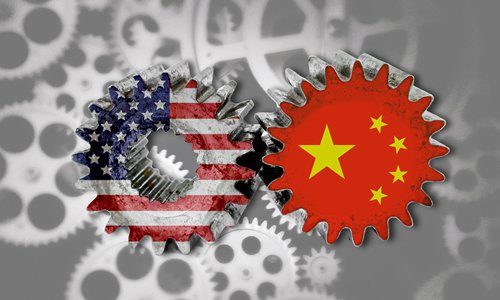HOME >> SOURCE
Trade war just prelude to US-China tech competition
Source:Global Times Published: 2019/12/22 21:29:23

Photo: GT
While trade tensions between China and the US seem to have eased for the moment, a US-China high-tech war may be brewing, with 2020 likely to be the start of the technology competition.US President Donald Trump signed on Friday a $1.4 trillion government spending bill that sees budget increases for most US research agencies next year. According to details previously released from the final 2020 spending bill, Congress agreed to give science-related agencies much more money than the cuts Trump had sought in his 2020 budget request.
Specifically, the budget of the National Institutes of Health will rise by 7 percent to $41.7 billion, while that for the National Science Foundation will grow 2.5 percent to $8.28 billion. The budget for the Department of Energy's Office of Science is up 6.3 percent to $7 billion.
Despite disagreements over military spending among Democrats, Republicans and the White House, their attitudes toward enhanced support to scientific and technological advances seem to be in line. It shows that to a certain extent, the trade war has helped forge a consensus in the US to step up high-tech competition against China in the long run.
The US by many standards is still a world leader in cutting-edge technologies like artificial intelligence algorithms, but China's lead in next-generation 5G networks remains a source of unease for the US and an incentive for it to catch up. The situation is reminiscent of the impact of the Soviet Union's early victories over the US in the space race decades ago.
China is ahead of the US on 5G deployment, but the US is going all-out to catch up on the technology, which offers faster data speeds to support the development of other emerging technologies.
While the past year saw the Trump administration crack down on Huawei, the world's largest 5G equipment supplier in terms of market share, citing national security risks, 2020 is expected to see the US government begin the development of its own 5G network in full scale to close the gap.
As to how, some like former US Treasury secretary Hank Paulson are calling for a catch-up strategy, given the fact that the US still has no major domestic manufacturers of 5G equipment. Others see the potential merger between T-Mobile and Sprint as an inevitable way to compete with China on 5G deployment.
Like the US on 5G, the same logic goes for China's catch-up in other high-tech aspects. China has also seen the necessity and urgency of developing its own high-tech sector independently through the trade war, which is likely to see strengthened government support and accelerated investment in technological development in the coming years.
In that sense, the US-China trade war may be just a prelude to their high-tech war in the long run.
Posted in: GT VOICE